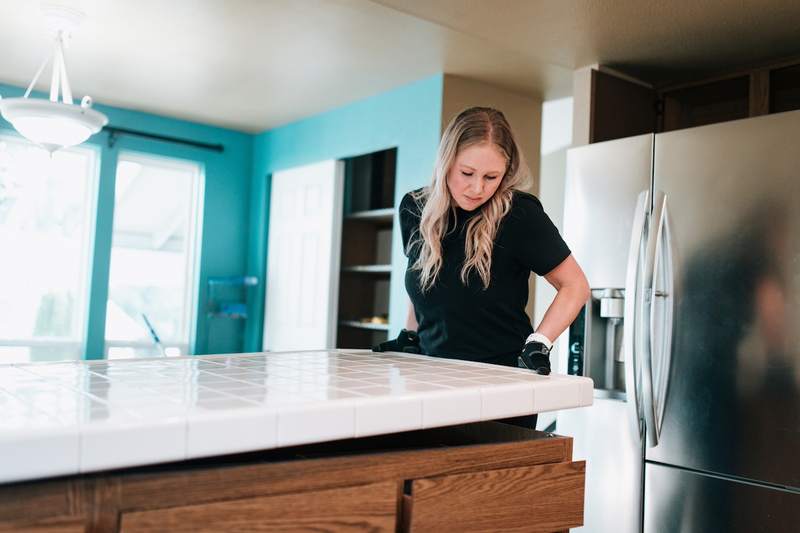Struggling with credit card bills? Are the high interest rates that come with your cards causing your credit card debt to grow faster than you can pay it off? A home equity loan might help.
Using a home equity loan for debt consolidation can make sense because these loans come with far lower interest rates than credit cards. You can use the money from a home equity loan to pay off your higher-interest credit cards. You’d still have to pay back your home equity loan, but that debt is less expensive because it comes with a lower interest rate.
Just be careful: If you fail to pay back your home equity loan on time, you could lose your home.
What Does It Mean To Use A Home Equity Loan For Debt Consolidation?
The amount you can borrow with a home equity loan is based on how much equity you’ve built in your home.
Equity is the difference between what you owe on your mortgage and what your home is worth. If you owe $150,000 on your mortgage and your home is worth $250,000, you have $100,000 in equity.
You can then borrow against this equity with a home equity loan. Typically, home equity loans may be approved up to 90% of your home’s worth, but this figure may vary by lender. To calculate your home equity loan limit, multiply your home’s value by .9. If your home is worth $250K, then the maximum amount that could be borrowed is $225K. You then need to subtract any outstanding mortgage balance from the maximum loan amount. In this example, that would be $225K – $150K = $75K. This is the maximum home equity loan available to you if your chosen lender allows a 90% loan-to-value ratio.
You can use the money from a home equity loan on whatever you’d like, such as paying for home renovations or helping to fund a child’s college education.
You can also use this money to pay off the high-interest-rate credit card debt or personal loan debt that you’ve racked up, essentially swapping the high interest rates of credit card debt with the lower rates of a home equity loan.
See What You Qualify For
Buy A Home
Discover mortgage options that fit your unique financial needs.

Refinance
Refinance your mortgage to have more money for what matters.
Tap Into Equity
Use your home’s equity and unlock cash to achieve your goals.
Why Use A Home Equity Loan For Debt Consolidation?
Why should you use a home equity loan to consolidate your debt? There are several reasons this might make financial sense.
Lower Interest Rates
Credit card debt comes with high interest rates. The Federal Reserve Board says that in May of 2023, the average interest rate on credit card debt was 20.68%. The interest rates for home equity loans are typically lower. For instance, as of September of 2023, home equity loans with interest rates between 8.01% and 9.94% were available.
When you take out a home equity loan, you can swap debt that comes with a higher rate for debt with a far lower rate. This could save you thousands of dollars depending on how much high-interest-rate debt you owe.
Fixed Payment Schedule
When you take out a home equity loan, you’ll receive your payment in a single lump sum. You’ll then repay what you’ve borrowed each month. How long this takes varies depending on your loan’s term. Your loan might have a term ranging from 5 to 30 years.
Most home equity loans are also fixed-rate loans, meaning that your interest rate will not change over time. Because of this, your monthly payment will remain the same. This makes it easier to budget for these payments. With credit cards, your minimum monthly payment might rise or fall depending on how much you owe.
Fewer Monthly Payments
If you pay off your credit card or personal loan debt with a home equity loan, you’ll be left with fewer monthly payments to juggle. Instead of making payments on, say, three credit card accounts and a personal loan, you’ll only need to remember to make one monthly home equity loan payment. This can simplify your personal finances.
Get a Home Equity Loan online.
Let’s match you up with lenders who can help with your unique financial situation.
Are There Risks Using A Home Equity Loan To Consolidate Debt?
There are risks, though, with a home equity loan. Make sure you understand them before applying.
You Need To Make Your Full Payment Every Month
You don’t have to pay all your credit card debt each month. You’re only required to make your minimum monthly payment. Doing this could cause your credit card debt to grow thanks to the high interest rates attached to it. But if you are short on cash, you always have the option to make a minimum payment.
This doesn’t happen with home equity loans. You’ll need to make your full payment each month, even if your cash flow is limited. Make sure, then, that your household budget can comfortably fit your home equity loan payment –d all of it — each month.
Potential To Add More Debt
Consolidating your debt into one loan is convenient, but it doesn’t make your existing debt go away. And if you’re not careful with your spending, you might add even more debt.
You might take out a home equity loan and use those funds to pay off $10,000 of credit card debt. But if you start using your cards again and don’t pay off your balance in full? You’ll simply add new debt onto the existing $10,000 you are already paying off.
Risk Of Losing Your Home
A home equity loan is a secured loan, one backed by collateral. In this case, that collateral is your home. If you fail to make your home equity loan payments, you might lose your home. That’s not a risk that comes with credit card debt or personal loans.
Loss Of Available Home Equity
You’ll lose at least part of the equity that you’ve built in your home when you take out a home equity loan. Say you owed $150,000 on your mortgage and your home was worth $350,000. You had $200,000 of equity. But if you take out a home equity loan for $100,000, you’ve cut your available equity in half, lowering it from $200,000 to $100,000.
This could hurt if you suddenly need to tap your equity again or if you sell your home before you pay off your home equity loan. With less equity, you’ll earn less profit after selling because you’ll use more of the sale proceeds to pay off the mortgage debt you owe.
How To Get A Home Equity Loan To Pay Off Debt
Getting a home equity loan isn’t an overly complicated process, but it will take some work on your part. Here are the steps to follow if you’re ready to tap your home’s equity.
Determine Your Available Equity
The first step is to roughly determine your available home equity. To determine exactly how much equity you’ve built, you’d hire a real estate appraiser who would determine the value of your home. But that step comes later, after you apply for a home equity loan with a lender.
You can, though, get an estimate of your equity by looking up your home’s value on public real estate websites. Just remember: This is an estimated value. An appraiser might later determine that your home is worth more or less than this amount.
Once you have an estimated value, simply multiply that value by .9 and subtract the amount you owe on your mortgage from this figure. If you estimate that your home is worth $350,000 and you owe $280,000 on your mortgage, you have an estimated $70,000 of equity.
You usually won’t be able to borrow that full amount. Most lenders let you borrow a percentage of your loan-to-value ratio (LTV). In the example above, you have $70,000 of equity, but using the formula for a 90% LTV ($350,000 x .9 – $280,000), the most you could borrow with a home equity loan is $35,000.
Apply For A Home Equity Loan
You can apply for a home equity loan with your current mortgage lender, but you aren’t required to. You can also shop around for lenders that offer lower interest rates and fees.
To apply, you’ll typically have to fill out an online form listing your income and debts, including how much you owe on your primary mortgage. Most lenders will require that you provide copies of certain documents to verify your income, including your last two paycheck stubs, last 2 months of bank account statements, last two years of income-tax returns and last 2 years of W-2 forms.
Your lender will then analyze your income and debts and check your credit to determine how likely you are to repay your home equity loan.
Turn your home equity into cash.
See how much you could get.
Get A Home Appraisal
Your lender will probably require a home appraisal to determine your home’s equity.
During this process, an appraiser will visit your home, touring both its outside and interiors, testing to see if your appliances work and counting your home’s bathrooms and bedrooms. This appraiser will also look at the sales prices that similar homes in your neighborhood have fetched in recent years. Armed with this information, the appraiser will determine how much your home is currently worth.
Once your lender knows your home’s current market value, it can use this figure to help determine how much equity you have in your residence.
You will usually have to pay for the appraisal. Costs vary, but you can expect to pay $600 – $2,000, depending on the size and location of your home.
Pay Closing Costs
Home equity loans aren’t free. Your lender will charge closing costs for a home equity loan that you can either pay upfront or roll into your monthly repayments. How much your lender charges will vary, but you can expect to pay from 3% to 6% of your loan amount in closing costs. If you are borrowing $60,000, you can expect to pay from $1,800 to $3,600 in closing costs.
These fees cover the costs that your lender incurs while originating your home equity loan and checking your credit and income.
Pay Your Debts
Once you’re approved for a home equity loan and you receive your lump-sum payment, pay off your credit card and other debt as soon as possible. Don’t wait, and don’t use the money you’ve received on other purchases. The longer you wait to pay off your debt, the more interest you’ll pay on it. If you eliminate your debt as soon as you receive your home equity loan dollars, you’ll no longer have to worry about that high-interest-rate debt continuing to grow each month.
Start Repaying Your New Home Equity Loan
You’ll repay your home equity loan in monthly payments, with interest, just like you do with your primary mortgage. How many payments you make depends on how long your loan’s term is. With a seven-year home equity loan, you’ll make 84 total payments over seven years. With a five-year home equity loan, you’ll make 60 total payments over five years.
Don’t miss these payments: If you pay late or stop making payments, your lender can charge late fees and eventually initiate foreclosure proceedings against you.
Other Ways To Consolidate Debt Using Home Equity
A home equity loan isn’t the only way to consolidate your debt. Consider these other options, too.
Home Equity Line Of Credit (HELOC)
A home equity line of credit (HELOC) also lets you tap your home equity. But instead of receiving your money in a single payment that you pay back over time, you get a line of credit based on how much equity you have in your residence.
Say you have $100,000 of equity in your home. Your lender might approve you for a line of credit of $80,000. You can then borrow against your HELOC up to that amount for anything you’d like, including consolidating your debt.
You only pay back what you borrow. If you borrow $30,000 to pay off your credit card debt, you’ll only have to pay back that amount, with interest.
Consider a HELOC a bit like a credit card, but with your credit limit based on the amount of equity you’ve built in your home.
Cash-Out Refinance
You can also apply for a cash-out refinance – if you have enough equity in your home – to consolidate your debt. In this type of refinance, you refinance for more than what you owe on your mortgage. You can then use the extra cash however you want, including for consolidating debt.
Say you owe $150,000 on your mortgage. You might refinance that loan for a new one totaling $200,000. You’d then take the extra $50,000 to pay off your debt.
Just remember: You must pay back the full amount that you borrowed. A cash-out refinance, then, will cost you more in the long run than a traditional refinance.
Home Equity Loan Debt Consolidation FAQs
Questions about home equity loans and debt consolidation? Here are some answers to the questions that homeowners most frequently ask.
What credit score do I need to qualify for a home equity loan?
There is no set guideline for how high of a credit score you’ll need to qualify for a home equity loan. Every lender is different. In general, though, most lenders will require that you have a credit score that is equal to or higher than the credit score you need to qualify for a primary mortgage. Typically, you’ll need a FICO® credit score of at least 640 to qualify for a home equity loan from many lenders.
How will debt consolidation with a home equity loan affect my credit score?
This depends. If you take out a home equity loan and make your payments on time each month, your credit score will usually improve. That’s because on-time payments are reported to the national credit bureaus of Experian®, Equifax™ and TransUnion®. If you make your payments 30 days or more past their due date, though, your credit score will tumble. The smart move is to make your home equity loan payments on time every month.
Can I consolidate debt without using my home equity?
Yes. You can apply for a credit card that offers a 0% introductory interest rate on balance transfers. With this option, you can transfer the debt from one or more credit cards to your new card. If you pay your debt back during the introductory period, you’ll pay no interest.
For example: A credit card might offer 0% interest on balance transfers for 12 months. If you pay back the debt you transferred during those 12 months, you’ll pay no interest on it. If you don’t, your remaining debt will be hit with your new card’s standard APR, which could be an interest rate as high as 29.99%.
You can also apply for personal loans, using the money from these loans to pay off your credit card debt. The challenge is that personal loans, though their interest rates are typically lower than those attached to credit cards, usually come with interest rates that are higher than home equity loans.
The Bottom Line
Ready to consolidate your high-interest-rate credit card debt? Get started today to see your options so you can make the best financial decision.
Get a Home Equity Loan online.
Let’s match you up with lenders who can help with your unique financial situation.

Dan Rafter
Dan Rafter has been writing about personal finance for more than 15 years. He's written for publications such as The Washington Post, Chicago Tribune and Wise Bread.












